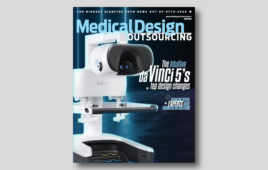
A look at human immune cells that help explain implant rejection. [Image courtesy of Johns Hopkins]
The team set out to evaluate why human bodies frequently reject implanted biomaterials, Few ways currently exist to predict this or to prevent it from happening, the researchers said.
Joshua Doloff led the team, which included biomedical engineering graduate students Victor Quiroz and Amanda Rakoski. The team published the results from the model in Science Advances.
“By directly studying how human immune cells interact with implants in a mouse, we can unlock a much deeper level of mechanistic understanding of implant rejection responses,” said Doloff. “It’s our hope long-term that this newly identified humanized mouse model variant will be useful for expanding preclinical screening results so that implants have a higher rate of translational success into patients.”
About the mouse model study
Doloff’s team found the first humanized mouse model variant capable of investigating why scar tissue forms around an implanted device. This process, known as fibrosis or foreign body response, can cause pain to the patient and damage or envelop an implant, rendering it ineffective.
The team said it faced a hurdle previous studies had failed to clear — they couldn’t get their humanized mouse models to develop biomaterial-induced fibrosis.
“The human immune system comprises two distinct ‘arms’ that work together to defend the body against disease and infection: the innate arm and the adaptive arm,” Doloff said. “When we evaluated some of these previous humanized models, we noticed that while the mice had developed appropriate levels of adaptive immune (T and B) cells, they were missing the entire innate arm of their immune system. This presented us with a challenge because the innate arm contains the cells that are necessary for fibrosis to occur, namely ‘macrophages.’”
Doloff’s team aimed to counter the challenge by genetically modifying the mice to express three additional human cytokines. That signaled molecules that in turn help to stimulate an innate immune response. The team then inserted different material implants into the mice, using either hydrogels or plastic polymers like silicone.
The outcome
This was a success — the team saw the early development and progression of fibrosis. That included which human immune cell types drove the condition and how they localized around the implant. Doloff finds the model valuable because it provides evidence of the importance of macrophages to fibrosis. Without those cells, no scar tissue forms around implanted devices, according to Johns Hopkins.
Doloff and his team also saw “crosstalk” between human macrophages and mouse fibroblasts.
“Although macrophages and fibroblasts are known to be key players in fibrosis, our model allows the opportunity to reveal more about how human immune cells interact with both the implant as well as downstream players in regulating this process,’ Doloff said.
Future applications of this model could help understand how specific biomaterials and implant sites affect fibrosis, the team believes. The researchers hope to translate their findings to human applications such as generating predictive, personalized tools for understanding and preventing fibrosis and implant rejection.
“In the future, it may be possible to predict the host response to an implanted biomaterial and even intercept implant rejection at early stages of its development in patients,” said Doloff.
Related: New implant design prevents scar tissue without drugs, MIT says




